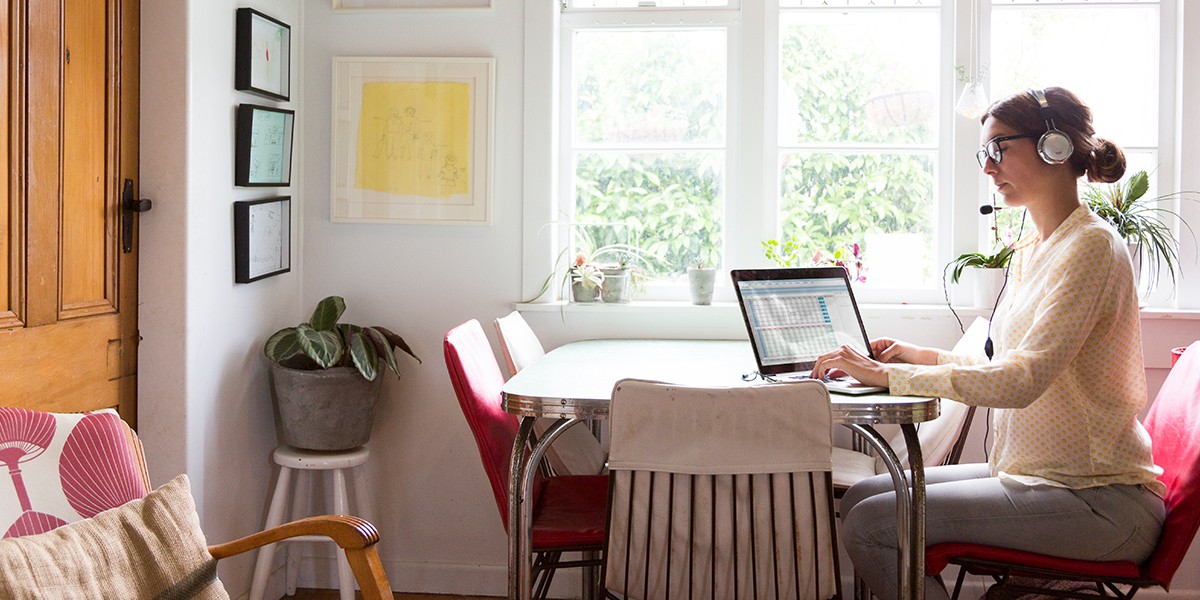About one in three Canadians will get shingles. But timely treatment can lessen symptoms, and a vaccine can help prevent it.
How to work from home during coronavirus (COVID-19)
Has your employer asked you to work from home due to COVID-19 concerns? Here’s how to do it productively.

Please note: This article is accurate at the time of publication (stated above). But with the situation around coronavirus changing frequently, you may not see the most up-to-date information in the text below. To receive the latest updates around COVID-19, please visit the World Health Organization’s (WHO) website and the Government of Canada’s COVID-19 page.
Telecommuting. Working remotely. Working from home. Call it what you want, so long as you don't come into the office. That's what many companies are asking of their employees during the latest coronavirus (COVID-19) pandemic.
You've probably heard about people being asked to self-isolate and work from home due to COVID-19. But what does it all mean? And how can you make working from home work for you? Here's what you need to know.
What is a coronavirus (COVID-19) self-isolation?
Self-isolation basically means staying at home and limiting your contact with others for 14 days. It's a way of separating a sick person from people who aren't ill.1
Right now, the Government of Canada only recommends self-isolation if:
- you have COVID-19,
- you've travelled outside of Canada, or
- your local public health authority identifies you as a close contact of someone with COVID-19.
What if you don't have COVID-19 or haven't been in contact with a COVID-19 patient? You may still want to self-monitor your health. This means watching out for symptoms of respiratory illness such as fever, cough and difficulty breathing.
If symptoms develop, you must:
- stay home,
- limit contact with others,
- contact your local public health authority and follow their instructions and advice.
Has your employer asked you to self-isolate or work from home during coronavirus?
To reduce the risk of spreading the disease, many employers have instructed employees to work from home. (That's only if it's possible for them to do their job at home.)
This doesn't mean you have to self-isolate and only stay at home. It just means that you shouldn't come into the office.
There are plenty of benefits to working from home or telecommuting. It means you can:
- have a more flexible schedule,
- avoid long commutes (which saves you money), and
- make your own meals and avoid lunching out (which also saves you money).
But working from home also means you have to:
- be disciplined about getting your work done and
- put a limit on at-home distractions that aren't urgent.
So how do you make working from home actually work for you? Here are a few tips to keep in mind.
How to work from home productively
1. Get dressed for work even if you're not going into the office
You don't have to dress too formally since you'll be at home. But getting out of your pajamas and into some casual or business casual clothes can help get you out of bed and into work mode. It also helps in case you have to hop on an impromptu video conference with your colleagues.
2. Have desk space set up
Do you have a desk or home office set up in your home? If you don't, then you may want to invest in a standing desk or a regular desk and an office chair with armrests. You can also use any table surface and chair in your home, so long as it makes you feel comfortable, awake and engaged.
Just make sure you're not lying in bed or your couch all day. It won't help you stay productive at work and it may even hurt your back or posture.
3. Have a VPN and other necessary online tools set up
Are you set up with your company's Virtual Private Network (VPN)? Talk to your IT department about getting VPN access before you start working from home.
Having a VPN set up in your work laptop can help ensure you're securely accessing and sending company files.
You'll also want to make sure you're computer has the right apps and software for you to complete your job at home. This includes access to video-conferencing tools and workplace messaging apps to communicate with other staff members.
4. Talk to your employer about working off hours if you're caring for family
Do you have kids or other family members self-isolating at home? Most employers are aware that some provinces, among them Ontario, Quebec and Alberta, have closed down schools due to COVID-19 concerns.
Inform your employer now of your family situation and that you're working from home with kids. Tell them you may need more time during the day to take care of them. Let your employer and colleagues know what hours you'll be available. They'll be more understanding about your flexible working hours and family interruptions if they know about your situation ahead of time.
You'll also have to tell your employer if anyone living with you has or show symptoms of COVID-19. They may ask you to self-monitor your own health for two weeks and keep them updated on any changes.
5. Reduce at-home distractions that don't require your immediate attention
Working from home may give you the flexibility to run a quick errand or be available to receive deliveries and home repairs. But it's best to try to reduce optional distractions that don't require your immediate attention, like television, Netflix, pets and household chores. You can do those during after-work hours.
6. Make a schedule for yourself and try to stick to it
Working from home can give you flexible hours. This means you may not have to fit the nine-to-five timeframe. But you still have to plan your day with time-slots for meetings and getting work done. So remember to hold yourself accountable by making a schedule and sticking to it. Determine the start and end of your workday, and stay true it.
Talk to your employer before you start working from home during COVID-19
Be sure to review your employer or company's policies around working from home, self-isolation and the latest coronavirus. If they haven't provided any clear policies and procedures yet, ask for them.
Some employers may insist that you stay at home or work from home if you're feeling sick or experiencing COVID-19 symptoms.
Others may recommend self-isolation for a certain amount of time if you:
- have recently travelled to a country with a coronavirus outbreak or
- have been in contact with someone who's travelled to a country with a coronavirus outbreak.
Your employer can also answer any questions you may have regarding sick days and paid leave for unpredictable health events like COVID-19.
It's important to have a clear understanding of what you can expect from your employer during this time. Here are some questions you may want to ask:
- How does working from home and self-isolation affect my pay?
- Does self-isolation count towards my sick days?
- If I get covid-19, will I still get paid?
- When can I stop working from home?
Please talk to your HR department for more information.


